 Petzlover
PetzloverAlano Espanol is originated from Spain but Moscow Water Dog is originated from Russia. Alano Espanol may grow 12 cm / 4 inches shorter than Moscow Water Dog. Alano Espanol may weigh 15 kg / 33 pounds lesser than Moscow Water Dog. Both Alano Espanol and Moscow Water Dog has almost same life span. Alano Espanol may have less litter size than Moscow Water Dog. Alano Espanol requires Low Maintenance. But Moscow Water Dog requires Moderate Maintenance
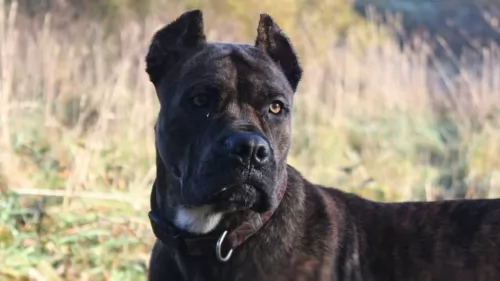 Alano Espanol is a very old breed and first data originate back in the 5th century. Alano has been used as dogs for war and dogs that traveled with explorers. After some, time Alano Espanol becoming more and more popular for bullfights and wild boar hunting. Nowadays, Alano Espanol is still not recognized worldwide, but it seems like this breed is getting more and more popular. They are excellent hunters and amazing working dogs.
Alano Espanol is a very old breed and first data originate back in the 5th century. Alano has been used as dogs for war and dogs that traveled with explorers. After some, time Alano Espanol becoming more and more popular for bullfights and wild boar hunting. Nowadays, Alano Espanol is still not recognized worldwide, but it seems like this breed is getting more and more popular. They are excellent hunters and amazing working dogs.
The Moscow Water Dog was developed in the Soviet Union around the same time as other classic Soviet dogs. The Moscow Watchdog and the Black Russian Terrier are a couple of these other dogs. The Water Dog came from crossing the Caucasian Oytcharka with the Newfoundland. The breed is known by many names including the Vodolaz which means “diver of deep Water”. The Moscow Water Dog was only bred in the Russian state’s Red Star Kennels as working dogs for the military.
Following the second World War, most of the working dogs had been destroyed during the war. Not enough dogs could be imported to begin a breeding program for any working breed. So, the Soviet Red Star Kennels began to create several working breeds. Included in this group with the Moscow Water Dog, were the Moscow Newfoundland, the Moscow Great Dane, the Black Russian Terrier, and the Brudasty Hound.
The only really successful breed coming from this program is the Russian Black Terrier. All the rest are either extinct or found only in Russia today. The Moscow Water Dog was supposed to be a life saver/water rescue dog, but the dogs they developed were too aggressive, and the program was scrapped. It seemed that the cross had bred a dog that had too much of the working water dog traits and not enough of the rescue dog traits. The military breeders tried to pass the dogs off as a Russian Newfoundland and sell it to the non-military.
These non-military owners of the few “Russian Newfoundland”, did not try to change the dogs through breeding. Instead over time they bred the Russian Newfoundland with pure bred Newfoundlands almost eliminating the “Russian” portion of the breed. By the early 1980’s the stock had been so diluted with the pure Newfoundland that the Russian Newfoundland was basically extinct.
The Red Army kennel had other breeds with some of the genes of this breed in their lines. This included the Brudasty Hound, the Moscow Great Dane, the Caucasian Oycharka, the Moscow Watchdog and the Russian Black Terrier. The Russian Navy was unhappy with the situation and never again let the army developed the Navy’s waterdog.
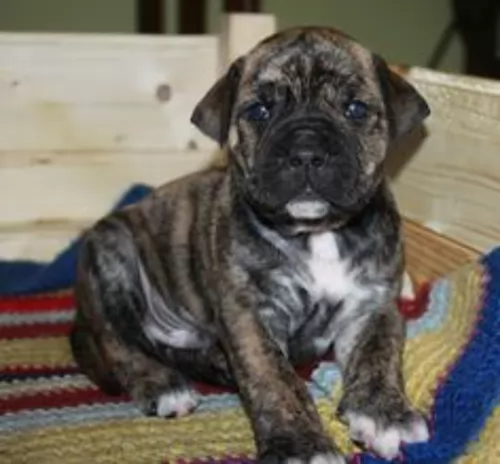 On average, Alano Espanol approximately weights 34-40kg, while their average height is 56-64cm. Females are slightly smaller than male dogs.
On average, Alano Espanol approximately weights 34-40kg, while their average height is 56-64cm. Females are slightly smaller than male dogs.
A lifespan of Alano Espanol variates but on average it is 11 to 14 years.
Litter Size is 4-8 puppies, but it depends on every dog.
Other Names for Alano Espanol are Spanish Bulldog and Spanish Alano.
The Moscow Water Dog was intelligent, vigilant, an excellent swimmer, and great in artic waters. However, he was too aggressive and instead of saving the swimmer, they would attack them. The Moscow Water Dog is a tall, balanced and powerful dog. They have a wide muzzle and a square head like the Newfoundland. Their eyes are dark and small while the ears are triangular. The nose and lips are black. He has webbed feet of course and a hanging tail.
The coat on the Moscow Water Dog was of course waterproof and double. The top coat is very dense, straight and soft. It is usually a dark brown with some black and white.
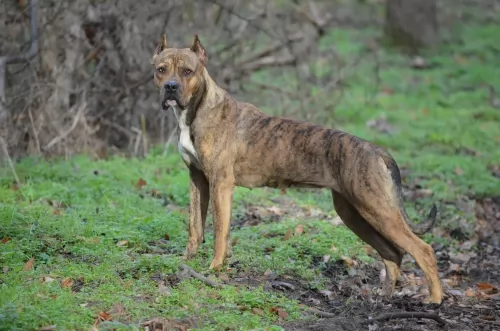 Alano Espanol is an extra-large breed but they are very well balanced breed and they tend to be very reliable and calm. They are not very comfortable living in the small apartments. They are better in houses. They are also very good with kids. Alano Espanol needs a lot of daily exercise with a minimum of 3 walks per day. Even though people used them for dogfights and bullfights through the history. They are not recommended for the first time owners because they are strong-willed dogs who tend to be leaders in the pack. Strong will and constant training are very important for them. They are very dominant breed and have Alpha character. Socialization is also very important for Alano Espanol because they are very powerful and they can easily hurt other animals. They will listen the master but it is important that they play and socialize with other animals from very young age. Alano Espanol can be a very good with other animals even in the same household, but only with proper socialization. If the dogs are the same sex, they tend to show dominance. Basically, they can be amazing pets, but it is important to train them properly.
Alano Espanol is an extra-large breed but they are very well balanced breed and they tend to be very reliable and calm. They are not very comfortable living in the small apartments. They are better in houses. They are also very good with kids. Alano Espanol needs a lot of daily exercise with a minimum of 3 walks per day. Even though people used them for dogfights and bullfights through the history. They are not recommended for the first time owners because they are strong-willed dogs who tend to be leaders in the pack. Strong will and constant training are very important for them. They are very dominant breed and have Alpha character. Socialization is also very important for Alano Espanol because they are very powerful and they can easily hurt other animals. They will listen the master but it is important that they play and socialize with other animals from very young age. Alano Espanol can be a very good with other animals even in the same household, but only with proper socialization. If the dogs are the same sex, they tend to show dominance. Basically, they can be amazing pets, but it is important to train them properly.
yes
Swimming and stamina
Yes but needed some land. Better in countryside.
This is an intelligent dog, but he could not be trained out of his aggressiveness.
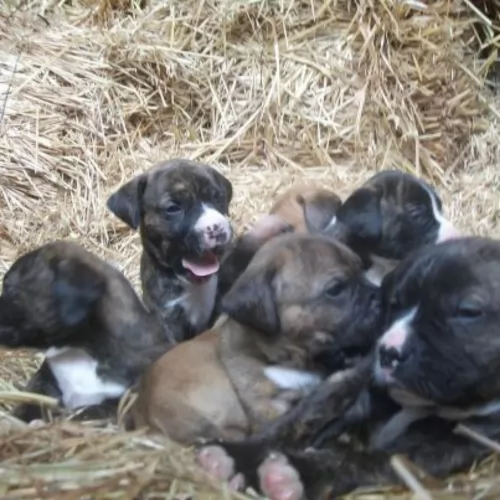 Alano Espanol is a very strong and healthy breed. They do not have any major health issues. Aldo, as with every large breed you should be careful of dogs genetic because they might have dysplasia. However, they are very healthy dogs with no health issues so your dog will live happy and healthy life with a proper care and occasional vet examination.
Alano Espanol is a very strong and healthy breed. They do not have any major health issues. Aldo, as with every large breed you should be careful of dogs genetic because they might have dysplasia. However, they are very healthy dogs with no health issues so your dog will live happy and healthy life with a proper care and occasional vet examination.
Because the breed was around for such a short period there is not a lot of documentation or information regarding genetic or propensity health issues. There are however a few issues that just his heritage and Newfoundland blood would lend itself to.
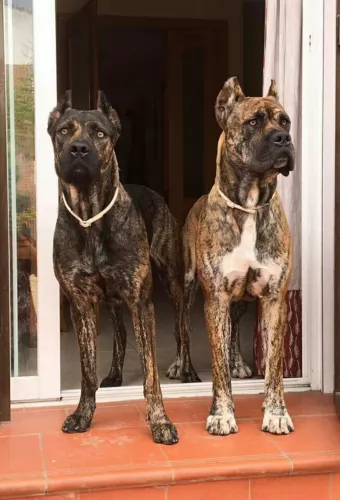 Feeding habits of any dog depend on daily activity and size. Alano Espanol should eat approximately 4-5 cups of high-quality food divided into two meals. You can also add some vegetables, fruit, oil or basically anything that you see your dog enjoy eating.
Feeding habits of any dog depend on daily activity and size. Alano Espanol should eat approximately 4-5 cups of high-quality food divided into two meals. You can also add some vegetables, fruit, oil or basically anything that you see your dog enjoy eating.
Alano Espanol puppies need more food divided into 3-5 meals per day. It is very important that puppy has all the necessary vitamins and minerals to develop into a big and healthy adult.
Alano Espanol is a very easy breed to groom. They have short hair with no undercoat, so minimal grooming is all that it takes. Alano does not drool, so it is not very hard to keep them clean. They will need occasional baths, but only when they are dirty because if you bath your dog too much, the skin could dry and start to itch.
Required high quality food made specifically for large or giant puppies. Feed 3-4 times a day a total of 21/2 -3 cups.
Required high quality food made for large or giant dog breeds. Feed twice a day a total of 2 cups.
The Moscow Water Dog did not need a high level of exercise, but they did have a lot of stamina. They loved to swim. Not overly active – more of a couch potato.